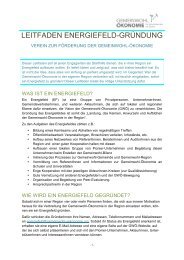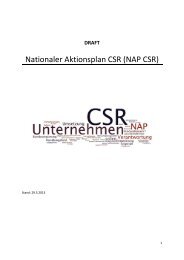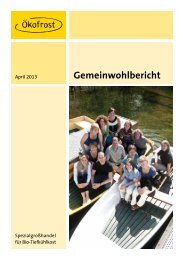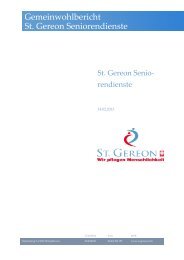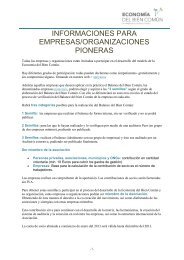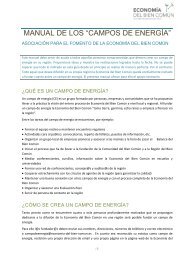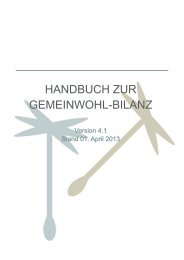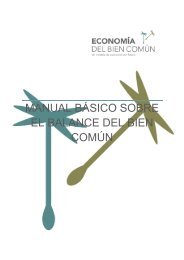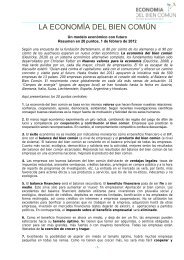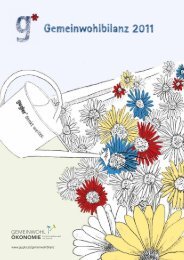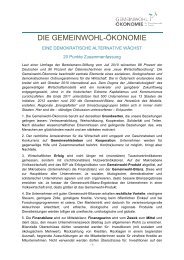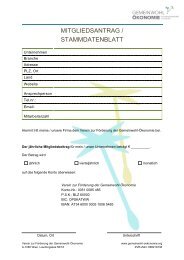Economy for the Common Good: 20 cornerstones
Economy for the Common Good: 20 cornerstones
Economy for the Common Good: 20 cornerstones
Create successful ePaper yourself
Turn your PDF publications into a flip-book with our unique Google optimized e-Paper software.
ECONOMY FOR THE COMMON GOOD<br />
A Democratic Alternative is Growing<br />
While <strong>the</strong> current economic model in some cases creates prosperity, it also creates a number of serious<br />
problems: unemployment, inequality, poverty, exclusion, hunger, environmental degradation, and<br />
climate change. Social and ecological crises are accompanied by three fundamental cultural crises: an<br />
existential crisis of purpose in life, a crisis of values and a crisis of democracy.<br />
In <strong>the</strong> eyes of many observers we are dealing with a fundamental systemic crisis, which can no longer<br />
be solved by individual re<strong>for</strong>ms, but only by a “system change”. Besides a change in fundamental values<br />
and a change in life styles we also need an evolution in <strong>the</strong> legal framework <strong>for</strong> <strong>the</strong> economic system.<br />
According to a poll by <strong>the</strong> Bertelsmann Foundation in <strong>the</strong> summer of <strong>20</strong>10, which was repeated in <strong>20</strong>12,<br />
80 to 90% of Germans and Austrians want a “new economic order”.<br />
The time is ripe <strong>for</strong> a new “great trans<strong>for</strong>mation” (Karl Polanyi), in <strong>the</strong> direction of embedding <strong>the</strong><br />
economy into <strong>the</strong> social context, into <strong>the</strong> set of constitutional base values, into people´s hearts and into<br />
<strong>the</strong> ecological foundations of life.<br />
<strong>20</strong> CORNERSTONES OF THE ECONOMY FOR THE COMMON GOOD<br />
1. The same collectively shared values that contribute to fulfilling interpersonal relationships are <strong>the</strong><br />
basis <strong>for</strong> <strong>the</strong> ECG: confidence building, cooperation, appreciation, democracy, solidarity. (Scientific<br />
research shows that fulfilling interpersonal relationships constitute a key factor to happiness and<br />
motivation.)<br />
2. A shift from competition and profit-orientation to cooperation and <strong>the</strong> pursuit of <strong>the</strong> common<br />
good will take place, established through a new regulatory incentive framework. Companies will be<br />
awarded <strong>for</strong> cooperation and solidarity. Competition will still be possible, but it may be disadvantageous.<br />
3. Economic success will no longer be measured by monetary indicators, but by non-monetary,<br />
value indicators. At <strong>the</strong> macroeconomic level (national economy) <strong>the</strong> GDP will be replaced - as an<br />
indicator of success - by <strong>the</strong> <strong>Common</strong> <strong>Good</strong> Product; on <strong>the</strong> microeconomic level (company) <strong>the</strong><br />
financial balance sheet by <strong>the</strong> <strong>Common</strong> <strong>Good</strong> Balance Sheet (CGBS). The latter becomes <strong>the</strong> main<br />
balance sheet of all companies. The more social, ecological and democratic, and cooperative<br />
companies become <strong>the</strong> better will be <strong>the</strong> results of <strong>the</strong>ir <strong>Common</strong> <strong>Good</strong> Balance Sheet. The better <strong>the</strong><br />
CGBS results of <strong>the</strong> companies of a national economy, <strong>the</strong> higher its <strong>Common</strong> <strong>Good</strong> Product.<br />
4. The better <strong>the</strong> common good result, <strong>the</strong> more legal advantages are granted to a certain<br />
company: lower taxes, lower customs, more favorable loans, and preferential treatment in public<br />
spending. Market access thus becomes easier <strong>for</strong> ethical companies, and fair, ethical, regional and<br />
ecological products become more af<strong>for</strong>dable than unfair, non-ethical, and environmentally harmful<br />
products.<br />
5. The financial balance sheet becomes a secondary balance sheet alongside <strong>the</strong> primary<br />
<strong>Common</strong> <strong>Good</strong> Balance Sheet. Financial profit is no longer an end, but a means. It merely serves to<br />
-1-
achieve <strong>the</strong> goal of <strong>the</strong> company or, to be more precise, <strong>the</strong> goal of all entrepreneurship: to fur<strong>the</strong>r and<br />
increase <strong>the</strong> common good. Business profits may be used <strong>for</strong> investments (with social and/or ecological<br />
value), loan repayment, accrued liabilities (to a limited extent), limited profit distribution to employees<br />
and <strong>for</strong> interest-free loans to o<strong>the</strong>r companies. Profits may not be used <strong>for</strong> distribution to non-employees,<br />
hostile takeovers, investments in financial markets, or donations to political parties. In return, <strong>the</strong> tax on<br />
corporate profits will be abolished.<br />
6. As profit is no longer an end in itself, companies may now aspire to <strong>the</strong>ir optimal size. They are<br />
not in danger of being bought out and <strong>the</strong>y are not <strong>for</strong>ced to outgrow or outper<strong>for</strong>m o<strong>the</strong>r companies.<br />
Businesses will be freed from <strong>the</strong> prevailing <strong>for</strong>ce of continual growth and <strong>the</strong> pressure of dog-eat-dog<br />
competition.<br />
7. Due to <strong>the</strong> possibility to aspire to and maintain <strong>the</strong> optimal size, <strong>the</strong>re will be many companies<br />
in all branches. As <strong>the</strong> <strong>for</strong>ce to grow ends, cooperation with o<strong>the</strong>r companies will be a lot easier.<br />
Companies can help each o<strong>the</strong>r with know-how, client-<strong>for</strong>warding, work<strong>for</strong>ce-sharing or interest-free<br />
loans. For <strong>the</strong>se acts <strong>the</strong>y will be rewarded with more favorable results in <strong>the</strong> CGBS – not at <strong>the</strong> cost of<br />
<strong>the</strong>ir competitors, but <strong>for</strong> <strong>the</strong>ir benefit. Companies start building a learning community, <strong>the</strong> economy<br />
turns into a win-win-setting.<br />
8. Inequalities in income and wealth will be limited through democratic discussion and decision:<br />
<strong>the</strong> maximum salary could be capped at, <strong>for</strong> example, 10 times <strong>the</strong> minimum wage, individual wealth at<br />
10 million euros. Capital transfer and inheritance can be permitted tax free up to 500,000 Euros and in<br />
<strong>the</strong> case of family-owned enterprises up to 10 million euros. Any exceeding amount is distributed to <strong>the</strong><br />
next generation via a “generational fund” like a democratic endowment. These figures will be discussed<br />
and finalized in democratically-run economic conventions.<br />
9. Large-scale enterprises with more than 250 employees partially pass over into a worker-owned<br />
structure or public ownership. Elected delegates of “regional economic conventions” will represent <strong>the</strong><br />
public. The government does not exercise authority over public enterprises.<br />
10. The same applies to democratic commons, <strong>the</strong> third category of property, next to a majority of<br />
(small) privately-owned businesses and a minority of large-scale enterprises owned (partly) by<br />
employees and <strong>the</strong> public. “Democratic commons” are enterprises which provide basic services in <strong>the</strong><br />
sectors of education, health, social welfare, mobility, energy, communication, and banking: services of<br />
general interest.<br />
11. The democratic bank is a major democratic common. Like every enterprise it serves <strong>the</strong><br />
common good and, as a democratic common, <strong>the</strong> democratic sovereign – not <strong>the</strong> government –<br />
exercises control over <strong>the</strong> bank. Its core services include guaranteed savings, low-interest loans, ecosocial<br />
high risk loans and free demand deposits accounts. The state will be financed primarily by interestfree<br />
loans from a central bank. The central bank gets <strong>the</strong> exclusive right to <strong>the</strong> creation of money and<br />
controls <strong>the</strong> cross-border movement of capital to end tax evasion. Financial markets as we know <strong>the</strong>m<br />
today will no longer exist.<br />
12. As described by John Maynard Keynes, a global currency cooperation will be established with<br />
a trade currency (“Globo”, “Terra”) to finance international trade and investment. On <strong>the</strong> local level,<br />
regional currencies can complement national currencies. To avoid unfair trade, <strong>the</strong> EU shall establish a<br />
fair trade area (<strong>Common</strong> <strong>Good</strong> Area) with equal standards. For importers, <strong>the</strong> tariff correlates with <strong>the</strong><br />
CWBS result: <strong>the</strong> better <strong>the</strong> result, <strong>the</strong> lower <strong>the</strong> tariff. The long-term goal is a Global <strong>Common</strong> <strong>Good</strong><br />
Area as a UN agreement.<br />
13. The intrinsic value of nature is recognized, thus it cannot become private property. A<br />
person/family/company who wants to use a piece of land <strong>for</strong> <strong>the</strong> purpose of living/farming/manufacturing,<br />
will be assigned what he or she needs <strong>for</strong> free or <strong>for</strong> a user fee. Receiving land will be preconditioned<br />
-2-
on ecological management and <strong>the</strong> fulfilling of a concrete need. As a consequence, land grabbing, largescale<br />
land ownership and real estate speculation will end. In return, <strong>the</strong> property tax will be abolished.<br />
14. Economic growth is no longer a political goal, ra<strong>the</strong>r <strong>the</strong> reduction of <strong>the</strong> carbon footprint and<br />
increasing sustainability. The categorical imperative as described by Immanuel Kant will be extended<br />
by an ecological dimension: One shall only choose a living standard that can be shared by all people of<br />
<strong>the</strong> world without diminishing <strong>the</strong> possibility of o<strong>the</strong>rs to choose <strong>the</strong> same living standard. Individuals<br />
and companies will be encouraged to reduce <strong>the</strong>ir carbon footprints to a globally just and sustainable<br />
level.<br />
15. Average working time will be reduced to 30 to 33 hours per week. As a consequence, people<br />
will have more time <strong>for</strong> o<strong>the</strong>r kinds of work: Human relations (care <strong>for</strong> children, sick and <strong>the</strong> elderly),<br />
personal development (arts, education, gardening) as well as community and political work. Due to this<br />
more balanced distribution of work time, <strong>the</strong> living standard will become less resource intensive, more<br />
sufficient and ecologically sustainable.<br />
16. One out of ten professional years will be a free year. In <strong>the</strong> free year, people can do what <strong>the</strong>y<br />
want. As a consequence, demand on labor markets will decrease by ten per cent – <strong>the</strong> present<br />
unemployment rate in <strong>the</strong> European Union.<br />
17. Direct democracy and participatory democracy will be added to representative democracy. The<br />
democratic sovereign (<strong>the</strong> people) will be able to influence <strong>the</strong>ir representatives, initiate and pass laws,<br />
change <strong>the</strong> constitution, and control important economic domains, such as railways, energy providers,<br />
or banks. In a “real democracy”, <strong>the</strong> needs and interests of <strong>the</strong> sovereign people and its representatives<br />
are identical. One condition <strong>for</strong> real democracy is comprehensive rights to codetermination and power<br />
control.<br />
18. All <strong>20</strong> <strong>cornerstones</strong> shall be developed in a broad bottom-up process, be<strong>for</strong>e <strong>the</strong>y are handed<br />
over to a democratically-elected constitutional convention. This convention proposes laws that are<br />
submitted to referendum. Those <strong>cornerstones</strong> that are approved by <strong>the</strong> people will be anchored in <strong>the</strong><br />
constitution. In any moment, <strong>the</strong> constitution can be changed– by <strong>the</strong> people! Alongside <strong>the</strong> economic<br />
convention, a number of o<strong>the</strong>r assemblies are summoned to fur<strong>the</strong>r develop democracy: education<br />
convention, media convention, democratic convention.<br />
19. To anchor <strong>the</strong> values <strong>for</strong> <strong>the</strong> common good deeply in <strong>the</strong> next generations, <strong>the</strong> educational<br />
system also has to serve <strong>the</strong> common good. This requires new <strong>for</strong>ms of school and new educational<br />
material, e. g. values and ethics, “emotionology”, communication, democracy and environmental<br />
awareness.<br />
<strong>20</strong>. As <strong>the</strong> parameters of entrepreneurial success have a new definition in <strong>the</strong> <strong>Economy</strong> <strong>for</strong> <strong>the</strong><br />
<strong>Common</strong> <strong>Good</strong>, different leadership skills will be required. Those persons that are socially responsible<br />
and competent, empathic and compassionate, socially and ecologically oriented will be <strong>the</strong> highest in<br />
demand and serve as <strong>the</strong> new role models <strong>for</strong> business leaders.<br />
The <strong>Economy</strong> <strong>for</strong> <strong>the</strong> <strong>Common</strong> <strong>Good</strong> is not <strong>the</strong> “best” economic model nor <strong>the</strong> end of history; it is only<br />
a next possible next step into <strong>the</strong> future. It is a participatory and open process that strives to work<br />
toge<strong>the</strong>r with o<strong>the</strong>r social movements. Thanks to <strong>the</strong> collective commitment of a growing number of<br />
courageous and resolute persons, we will be able to create something fundamentally new.<br />
Implementation depends on intrinsic motivation and personal responsibility, economic incentives, a legal<br />
framework as well as raised awareness.<br />
www.economy-<strong>for</strong>-<strong>the</strong>-common-good<br />
Last updated: April 19, <strong>20</strong>13<br />
-3-



